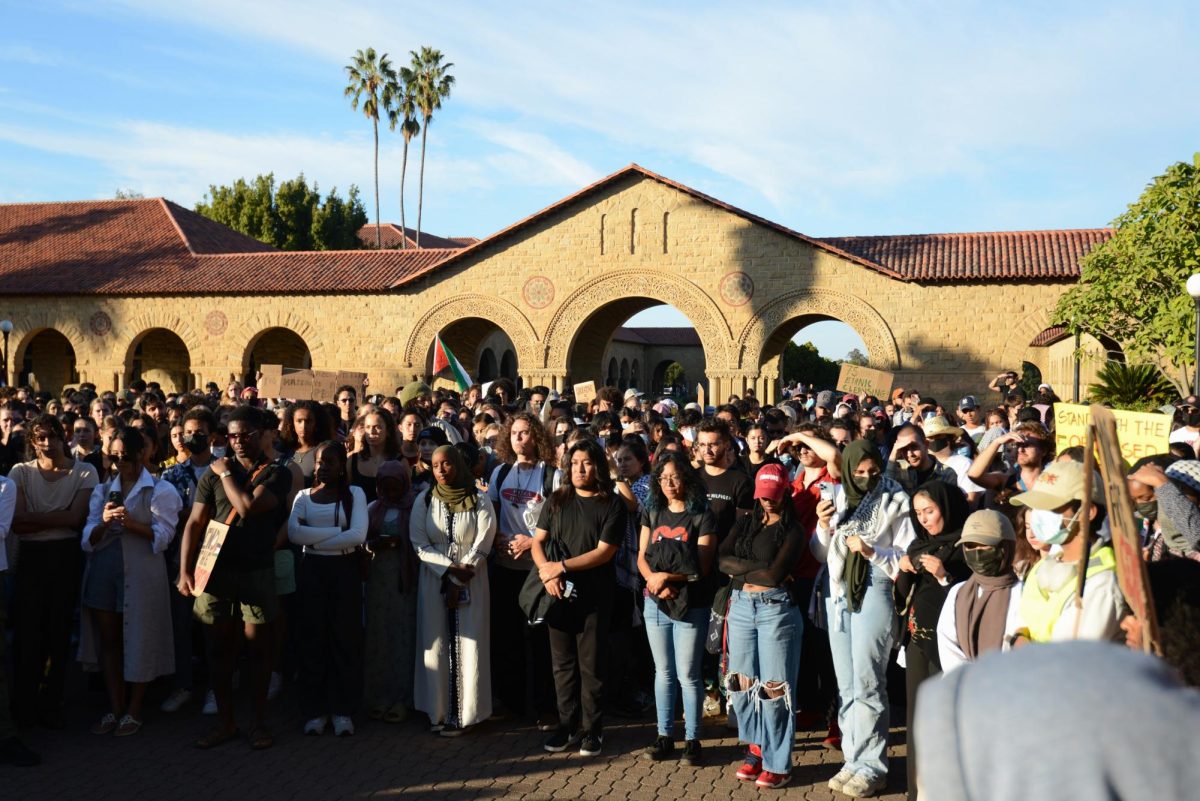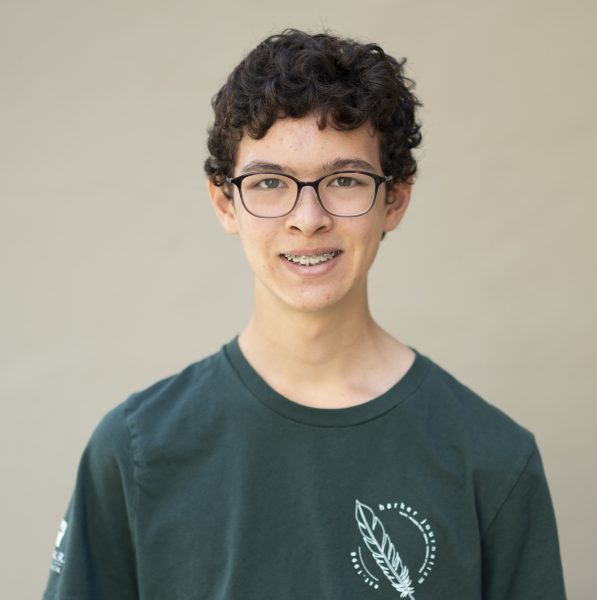The ongoing Israel-Hamas conflict enforced divisions between individuals of Israeli and Palestinian descent. Following Oct. 7, major U.S. news sources constructed entire sections towards recent developments, and updates on the conflict persist in everyday news. The widespread coverage of the Israel-Hamas conflict calls for recognition of wavering media credibility and objectivity.
Digital platforms stand as the most common medium for U.S. adults to access their news, and nearly half of U.S. adults often access social media sites to receive their news, according to studies conducted by the Pew Research Center. In an age where news aggregators like Apple News circulate existing content to large audiences, nearly a quarter of Americans cannot identify which prominent U.S. news sources do their own first-hand reporting.
As a result, readers with varying knowledge of history and bias in news sources can form different opinions on the information that online sources present.
“From what I’ve seen in the news, I feel like the narrative is trying to make it seem like the war started with the attack of Gaza on Israel instead of the previous conflicts in the past 75 years,” Reza Jalil (12), who is Pakistani-American, said. “It kind of removes part of the history of the conflict, and makes it seem like it’s a whole new thing.”
Readers commonly receive news on social media, which may not provide truthful information. False information spreads faster than truthful information according to a 2018 study conducted by researchers at MIT.
“I would really strongly reiterate to everybody that we have a tendency to see what looks like an infographic on Instagram and immediately believe that the information is true because it is presented in an infographic style layout,” upper school world history teacher Bronwen Callahan said. “I would just encourage everybody to really look at the wording and the accounts that are sharing them.”
Official news outlets may also generalize issues by publishing articles that do not provide complete context. This is done in an attempt to compete for viewers’ attention in a phenomenon called “attention economy,” a concept first developed by Herbert A. Simon in the late 1960s. The concept explains that a human’s capacity for attention is limited, and a large number of entities, such as the media, vie for that attention.
Business and entrepreneurship teacher Michael Acheatel follows the media’s coverage of the Israel-Hamas conflict and notices that the media oversimplifies the ongoing conflict through various shortcomings.
“I will say that it is overly simplified, whether that’s lacking the historical context or the political context,” Acheatel said. “Whether it is attempting to either showcase the result of one side’s suffering as a result of the others, regardless of whatever the media’s angle is, I find it as an oversimplification.”
In times of violent conflict, news sources may intentionally attempt to communicate views through stylistic elements such as word choice and omission. These elements can go unnoticed by readers.
Dr. Yonatan Mendel, a senior lecturer in the Department of Middle Eastern Studies at the Ben-Gurion University of the Negev, commented on the use of diction in Israeli media portrayal of the Israeli-Palestinian conflict in a 2008 journal from the London Review of Books.
Following a violent incident, the Israel Defense Forces (IDF) “confirms” a report while the Palestinians “claim.” Palestinians are not murdered, but rather “were hit,” “were killed” or “found their death.” In addition, IDF operations are never “launched.” They “respond” to missiles, attacks and violence. Palestinians “provoke,” “attack” or “incite.”
A similar possibility of word choice conveying a veiled version of the truth is present in the Western media’s coverage on Israel and Gaza.
“Depending on which side, they’ll change up the words,” Reza said. “For example, look at Palestine, instead of ‘slaughter,’ they’ll say, ‘Israeli forces killed Palestinians.’ But then when it’s the other way, they’ll use words like ‘slaughter,’ ‘dismember’ and ‘decapitated.’”
Office of Communication news and information manager Zach Jones said he noticed different language used to report on Israeli and Palestinian deaths.
“Just little things about the coverage that you will notice don’t come across as outwardly biased,” Jones said. “But upon further examination, the question then becomes, well, ‘How did they die?’”
This strategy in media coverage emphasizes the need for media literacy, according to Jones. Media literacy encourages readers to recognize how online media impacts their thoughts, emotions or behavior.
“I think a lot of media literacy starts with asking a very simple question: Where am I getting this info from?” Jones said. “And second of all, why might they have some kind of interest in reporting it in this way? So much of media coverage is really about putting across the idea of who is defending themselves and who the attackers are.”
Callahan also reiterated the importance of media literacy. News contains inherent biases, and the usage of words and the depiction of a conflict can sway unknowing audiences.
“News is always written by someone, and that person does have an opinion and is collecting from one source or another and is getting information from one group and not another,” Callahan said. “And it’s why media literacy is so important.”
Objective reporting, however, is not beneficial either, according to Jones. He explained objective reporting can cause the media to ignore power dynamics that, in this context, are established by the history of Israeli-Palestinian conflicts.
“Aiming for objectivity ignores power dynamics,” Jones said. “If you’re doing your job as a journalist, which is mainly researching, you do start to understand how power dynamics work. Not honestly reporting on that is a disservice to people.”
In addition, generalized reporting can cause polarizing divides in the public sphere. Callahan explained that generalizations that result in the unjust labeling of people fuels social tension.
“I think some of the roots of why people are offending so many people comes from people over-generalizing one person to represent a whole group,” Callahan said. “One government to represent all of its citizens, one person acting in the name of something to represent everybody who follows that particular belief.”
Stories containing bias, misinformation and generalization can exacerbate social divides. Many Americans already fault news and social media for encouraging social division by conditioning individuals with different beliefs to see each other as enemies. This discontent can only be furthered in times of grief and polarity through the veiled, inaccurate stories that the media presents.
“When you see something sensational on social media, immediately recognize that this is probably affirming some bias that I already had, which is why I’m seeing it in the first place on my social media because the algorithm knows what I like,” Acheatel said. “It’s affirming my own existing biases so I need to challenge that. I think the biggest thing is to challenge what you do see on social media, know your sources, and then ultimately, expect better out of your media outlets.”


















![“[Building nerf blasters] became this outlet of creativity for me that hasn't been matched by anything else. The process [of] making a build complete to your desire is such a painstakingly difficult process, but I've had to learn from [the skills needed from] soldering to proper painting. There's so many different options for everything, if you think about it, it exists. The best part is [that] if it doesn't exist, you can build it yourself," Ishaan Parate said.](https://harkeraquila.com/wp-content/uploads/2022/08/DSC_8149-900x604.jpg)




![“When I came into high school, I was ready to be a follower. But DECA was a game changer for me. It helped me overcome my fear of public speaking, and it's played such a major role in who I've become today. To be able to successfully lead a chapter of 150 students, an officer team and be one of the upperclassmen I once really admired is something I'm [really] proud of,” Anvitha Tummala ('21) said.](https://harkeraquila.com/wp-content/uploads/2021/07/Screen-Shot-2021-07-25-at-9.50.05-AM-900x594.png)







![“I think getting up in the morning and having a sense of purpose [is exciting]. I think without a certain amount of drive, life is kind of obsolete and mundane, and I think having that every single day is what makes each day unique and kind of makes life exciting,” Neymika Jain (12) said.](https://harkeraquila.com/wp-content/uploads/2017/06/Screen-Shot-2017-06-03-at-4.54.16-PM.png)








![“My slogan is ‘slow feet, don’t eat, and I’m hungry.’ You need to run fast to get where you are–you aren't going to get those championships if you aren't fast,” Angel Cervantes (12) said. “I want to do well in school on my tests and in track and win championships for my team. I live by that, [and] I can do that anywhere: in the classroom or on the field.”](https://harkeraquila.com/wp-content/uploads/2018/06/DSC5146-900x601.jpg)
![“[Volleyball has] taught me how to fall correctly, and another thing it taught is that you don’t have to be the best at something to be good at it. If you just hit the ball in a smart way, then it still scores points and you’re good at it. You could be a background player and still make a much bigger impact on the team than you would think,” Anya Gert (’20) said.](https://harkeraquila.com/wp-content/uploads/2020/06/AnnaGert_JinTuan_HoHPhotoEdited-600x900.jpeg)

![“I'm not nearly there yet, but [my confidence has] definitely been getting better since I was pretty shy and timid coming into Harker my freshman year. I know that there's a lot of people that are really confident in what they do, and I really admire them. Everyone's so driven and that has really pushed me to kind of try to find my own place in high school and be more confident,” Alyssa Huang (’20) said.](https://harkeraquila.com/wp-content/uploads/2020/06/AlyssaHuang_EmilyChen_HoHPhoto-900x749.jpeg)








Sam Lepler • Feb 9, 2024 at 9:29 am
Thank you Aquila for touching on an important issue.
That said, I am sorely disappointed with this piece.
1. If the piece is supposed to be about media bias in favor of Israel and against Hamas, then lead with that. Do not get neutral quotes about media literacy and questioning sources in a veiled attempt at some sort of balanced argument. The article’s main thesis is that the media is biased against Palestinians, so make your argument honestly. Use quotes honestly, pictures honestly, headlines honestly, and evidence honestly.
2. The argument of language as proof of bias is incredibly porous. The reason for the linguistic difference (IDF “soldier” vs. Hamas “fighter”, “militant”, or “terrorist”…… IDF and US Intelligence “confirm” reports while Hamas “claims”….. Palestinians “Killed by airstrike” vs. Israelis “Slaughtered at music festival”) exists to draw a moral line between the actions of Hamas and that of Israel and the United States. We do not refer to 9/11 as being carried out by “soldiers” in a “military operation”, even though Al Qaeda would see it that way. We use “terrorist attack” for a good reason, to draw a distinction between the moral standing of the US army and the moral standing of ISIS or Al Qaeda (or Hamas).
The article’s main thesis implies a moral equivalence between the actions of Hamas killing 1200 Israelis, the vast majority civilians dancing at a music festival, raping countless of them, and dragging their dead bodies through the streets, not to mention taking hundreds of hostages from babies to grandmothers and the IDF killing civilians, albeit many of them, amidst targeting tunnels and weapons caches in response to the October 7th “event” (and countless smaller other ones along with Hamas’ openly declared goal of wiping Israel off the map and killing all jews). Is drawing this moral distinction proof of bias?
Furthermore, there is also an implied equivalence expressed in the article in the credibility as a source of the IDF and US Intelligence and that of Hamas. Can you trust an organization like Hamas, ISIS, or Al Qaeda to be as reliable with information as the Israeli or US armies and intelligence agencies? That it is not to say that the US or Israel is always right or even fully truthful, but which source would you use language like “claims” vs “reports”?
Is it the position of these reporters and the Aquila that the US and Israeli intelligence is equally reliable as hamas? Is it the position of these reporters and Aquila that there is a moral equivalence between the actions of Hamas or ISIS or Al Qaeda and those of the IDF and US military?
3. I have no clue what media the authors are watching ,but there is no such thing as “Western Media”. Are FOX, CNN, NY Times, Wall street journal, the BBC, MSNBC all “Western media”? All those agencies have incredibly different takes. Fox is generally very pro-israel. CNN and many others are generally pro-palestinian.
On CNN today, here are the headlines about the war:
A) “Israel’s repudiation of a deal with Hamas draws fury from hostages’ families”
B) “Biden calls Israel’s response in Gaza over the top ”
C) “Some Arab American leaders left frustrated after meeting with Biden officials in Michigan over Israel-Hamas war ”
D) “Two Americans detained by IDF in Gaza, family says ”
E) a spread of pictures showing Gaza destruction.
Exactly which direction is this central “Western Media” source biased?
This article, in its simplistic and irresponsible propaganda aims, ignores the obvious bias above, in favor of disingenuous surface level linguistic “proof”, which (hopefully accidentally) draws a moral equivalence of a terror organization kidnapping, raping, and murdering Jews dancing at a music festival to the Israeli army’s attempt to eliminate a clear threat to national and personal security of its citizens that publicly, openly, and repeatedly aims to kill 7,000,000 Jews.
(Note: I do not claims that every Israeli action is justified. Nor do I claim that every Israeli report is perfectly accurate. I do not claim that civilian deaths are good on either side. I do not claim that the Israeli actions since October 7th (or before it) are perfect.)
Ella Yee • Mar 7, 2024 at 12:11 pm
Hello Mr. Lepler,
Thank you for taking the time to share your thoughts on this article.
Each member of our staff seeks to provide honest reporting through in-depth research and conversations with members of our community. In line with Harker Aquila’s mission statement and philosophy, we strive to ensure truth by including quotes accurately in the context in which they were given.
In this article, we aimed to showcase that language and grammar are tools that greatly influence public opinion and the mental models we create about groups of people. The purpose of this article is to convey the power that media wields through implicit messaging as diction hugely shapes public perception of major events, sometimes in negative ways. Language can imply moral authority (“upper hand authority,” for example), and the aim of this article was to establish that the choice to do so cannot be an arbitrary personal choice.
Implying morality through language is a tool that can perpetuate bias, no matter who it is used against. It is not our intention to take sides –– we do not condone violence against civilians on any side of this conflict.
We interviewed five community members for this article, including an adviser for Harker’s Jewish Affinity Group, a scholar in Middle Eastern studies who has worked with the Peace Corps in Jordan and Lebanon, a professional journalist, and the co-president of the Muslim Student Association.
We recognize diversity of sourcing as a core principle for the publication, and we constantly strive to increase the range of perspectives included in our work.
Thank you for opening this feedback loop, and we always welcome responses to our articles.
Will Gonsior • Feb 1, 2024 at 7:16 pm
China and many progressives are all running propaganda on the war. Why not pile on a bit from the other side? Education is propaganda. Despite the baggage that comes with the name, the stuff can be good for people. Public opinion is a weapon, and Hamas are currently winning the P.R. battle, here in the Aquila and across the globe. When a columnist like Bret Stephens launches another facts-based yet admittedly remarkably biased column in support of Israel, maybe that’s less of a problem and more of a strategic counterstrike that the US should laud for supporting its international goals. Israel are war criminals, but Iran and its proxies (including Hamas) are the enemy. If our media does what it can to keep the latter part of that sentence in sight (while sticking, at a bare minimum, to making only truthful statements) my complaints about it will be minimal.
Also, Hamas did not have a right to massacre Israelis and commit widespread sexual assault because some people on the other side of Israel from them with the same ethnicity were getting their houses stolen. Not how that works. Language that makes their campaign seem less justified than recklessly, callously (and yes, Israel have been reckless and callous) bombing the entrances to tunnels that were dug by terrorists to strategically come at a high cost to civilians if they ever *were* to be bombed is correct language, in my view.
Thank you for all the great reporting you do here at the Aquila!